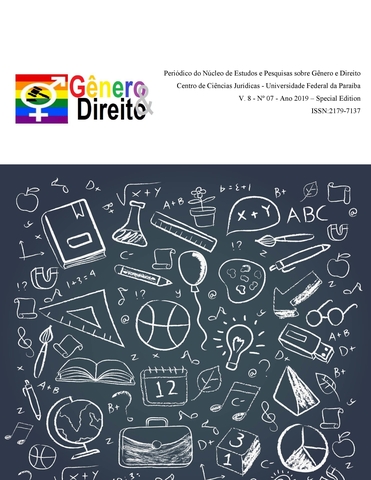STRUCTURAL AND WORD-FORMATIVE FEATURES OF VERBS OF BEHAVIOR IN THE TATAR LANGUAGE
DOI:
https://doi.org/10.22478/ufpb.2179-7137.2019v8n7.50009Palavras-chave:
Tatar language; semantics; a verb; verbs of behavior; word formationResumo
The articles are devoted to the study of one of the lexico-semantic groups of verbs in the Tatar language – behavioral verbs, which mean the action and actions of a person who has received one or another social coloring: This group of verbs differs from the verbs of other lexico-semantic groups by specific features: they represent the principles of human behavior in society. The relevance of the topic lies in the fact that the Tatar language does not study the structural-word-and-phraseological features of the verbs of behavior that would contribute to a complete and comprehensive analysis of the lexical structure of the grammar. In the article, the derivational possibilities of the Tatar language verbs at the level of the word-derivative paradigm are determined. In particular, the structural specificity of this verbal vocabulary was revealed, word-derivative values of suffixes forming behavioral verbs were revealed, as well as a number of auxiliary and modifying participles were also demonstrated. The analysis of structural and word-formative possibilities of verbs of behavior allows to reveal the specificity of relations between derivational and semantic segments of verbs of this group, and will also serve as a material for the study of the semantic relationship between motivating and motivated words.
Downloads
Referências
R.K. Ishtanova. Verbs of the Tatar language in the semantic aspect: dis. ... Cand filol. sciences. Kazan 2002.284 pages.
A.M. Aydarova. Verbs of behavior in the Russian, Tatar and English languages: Diss. ... Cand filol. sciences. Kazan 2016, 202 pages.
F.A. Ganiev. Modern Tatar literary language: suffixal and phonetic word formation. Kazan: Print House, 2005, 360 pages.
Tatar grammar. Kazan: Tatarsky kn. publishing house, 1993. Vol. I, 559 pages.
A.N. Eniki. Saylanma ȁsȁrlȁr. Kazan: (TARICH), 2002, 416 pages.
A.N. Enikeev. Stories and short stories. Translation from Tatar by A. Badyugina. Kazan, 1982. 256 pages.
LM. Akhmetzyanova, G.Kh. Gilazetdinova. “Lexico-semantic and linguo-stylistical analysis of A. Vvedensky's and D. Kharms' art texts”, XLinguae, Vol. 11, pp. 455-470, 2018.
K. Shermaymayti, A.Sh. Yusupova, E.N. Denmukhametovan. “Loans of word in synonymy of the Tatar language”, National academy of managerial staff of culture and arts herald, vol 2, pp. 270-273, 2018.
G.N. Khusnullina, R.M. Bolgarova, E.A. Islamova, M.S. Zholshayeva. “Comparisons of dishware names in Tatar and Russian languages”, AD ALTA: Journal of Interdisciplinary Research, Vol 7, pp. 112-115, 2017.
Rezaei, M., & Nemati, K. (2017). The Impact of Purchase Intent, Word of Mouth Advertising and Skill Domain of Seller on Quality of Customer Relationship to Sale Life and Savings Insurance Policies (Case Study: Dana Insurance Co., Bushehr Province). Dutch Journal of Finance and Management, 1(2), 43. https://doi.org/10.29333/djfm/5819
Mnunguli, J. P., & Kisangiri, M. (2018).
Evidence based Practices for Drug Abuse Information Management and Awareness Approaches. Journal of Information Systems Engineering & Management, 3(4), 31.
Metsämuuronen, J. (2018). Common Framework for Mathematics – Discussions of Possibilities to Develop a Set of General Standards for Assessing Proficiency in Mathematics. International Electronic Journal of Mathematics Education, 13(2), 13-39. https://doi.org/10.12973/iejme/2693
Zhampeisov, K., Balykbayev, T., Kolumbayeva, N. K. S., & Aitpayeva, A. (2018). National Component of the Training Content of the Teachers in Kazakhstan’s school. Opción, 34(85-2), 653-677

